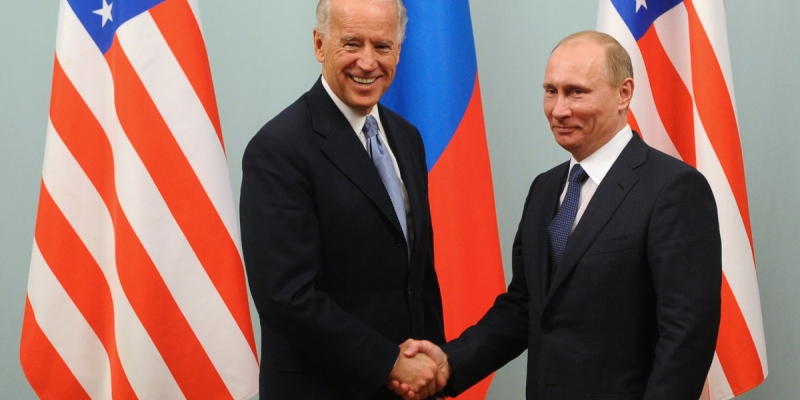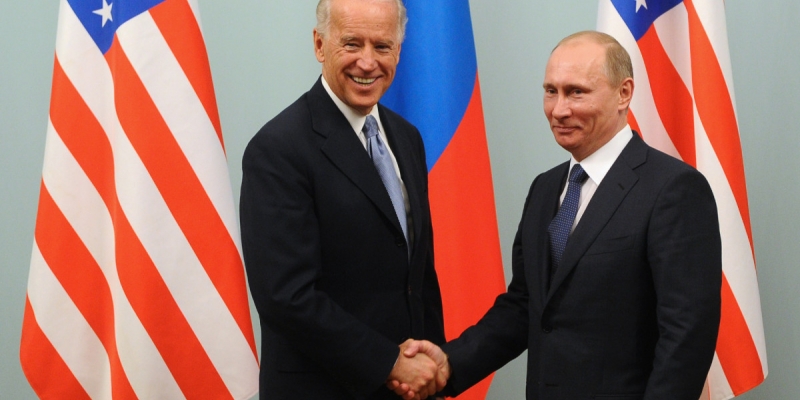On June 16, the first meeting of Vladimir Putin and Joe Biden will take place in Geneva. What the parties approached it with and what results in politics, economics and business to expect from the Russian-American summit, RBC understood

Joe Biden and Vladimir Putin
Under what circumstances will the Russian-American summit be held
For the sake of the meeting at the Geneva Villa La Grange, Russian President Vladimir Putin will break the pause in foreign travel caused by the pandemic-the last time he went abroad on a visit was in January 2020, for events in Jerusalem. Biden will also come to Switzerland during the first foreign trip since the beginning of his presidency, which began on January 20 this year.
If you look at the chronology of the last meetings of the American and Russian presidents, you can see that usually the first meeting after the inauguration of the new head of the United States was held just in the next spring or summer. Putin met with George W. Bush in May, with Barack Obama in April, with Donald Trump in July, and with Biden in June.
Biden’s trajectory to the summit with Putin follows the trajectory of his predecessor Trump, who also arrived at a separate bilateral summit with Putin (held in July 2018) during a European tour, after a visit to the UK. Biden began his European tour with a visit to the G7 summit in the United Kingdom, and will come to Geneva from Brussels, from the NATO summit.
What do the parties expect from the meeting
As relations between Russia and the United States continue to deteriorate, expectations from the current meeting between the parties are quite low. “We do not have any high expectations, illusions that some “breakthroughs” are coming. But there is an objective need for an exchange of views at the highest level on what threats Russia and the United States see as the two largest nuclear powers in the international arena, ” the Foreign minister stated on June 9.Russian Foreign Minister Sergey Lavrov. According to him, the very fact of the conversation between the leaders of the two leading nuclear powers is important. This repeats the approaches of the Russian side to the previous Russian-American summit in 2018. “Whatever we say, the very fact of the meeting is very important for building the appropriate chemistry of relations between the presidents in the future,” said Yuri Ushakov, an assistant to the Russian president, three years ago.
Trump as president, the Russian leader assessed positively, and in an interview published on June 12, NBC repeated that he considers him a “talented, outstanding politician”. Putin defined Biden as a “professional politician”. The American president in the run-up to the meeting avoided harsh characteristics of his future counterpart. If at the beginning of the term he agreed that Putin can be called a murderer, then during a press conference on June 13, he limited himself to calling the Russian leader an autocrat.
Video
In any case, both presidents expressed their willingness to engage in dialogue. It can be conducted on several topics. According to Lavrov, Russia wanted to find out the US approach to issues of strategic stability and cybersecurity. Biden said that the United States does not intend to seek confrontation, but intends to discuss issues on which the two countries have opportunities for interaction. AmongThe topics to be discussed were bilateral relations, Ukraine, Libya and Syria, North Korea, Afghanistan, and the coronavirus pandemic. This agenda is not much different from the one that was discussed three years ago. At that time, the focus was also on the crisis state of bilateral relations and ways to improve them, as well as international issues (Syria, North Korea, and others).
Putin and Biden assess the level of relations between the two countries equally. “Our bilateral relations have sunk to their lowest point in recent years,” Putin told NBC. “I think he’s right, this is the lowest point,” Biden agreed. The level of relations and expectations eloquently illustrates the refusal of Putin and Biden from the usual joint press conference for such meetings.
Since the previous summit, Russia and the United States have further complicated the work of each other’s diplomatic missions. In the spring, Russian and US Ambassadors Anatoly Antonov and John Sullivan returned to their capitals. Russia added the United States to the list of unfriendly states, banning the embassy from hiring Russians, which led to a further reduction in the size of the embassy and stopping the issuance of American visas to Russians. Moscow and Washington mutually expelled diplomats and government officialsin the sanctions lists (among those included in the US-deputy head of the presidential administration Sergey Kiriyenko and FSB Director Alexander Bortnikov; in the Russian-US Attorney General Merrick Garland and FBI Director Christopher Wray). Washington has twice imposed sanctions on Russia during Biden’s administration. The reasons were the poisoning and the situation with the opposition leader Alexei Navalny, Moscow’s alleged interference in the 2020 presidential election, and a cyber attack on the Solar Winds company.
“I think that during the meeting, both sides will focus on marking their red lines. It’s not just about getting every president to show a domestic and international audience that he can stand up to a colleague, it’s also important to move toward a more constructive relationship, ” Chris Tuck, Deputy director of political risk at GPW Consulting, told RBC.
What can be the political outcome
According to Putin, a good result of the summit was the opportunity to restore our personal contacts, establish a direct dialogue, and create a mechanism for interaction on topics of mutual interest. Experts call approximately the same key points. As stated at the conference & laquo; Primakov Readings & raquo; Americanexpert Tom Graham, the success of the meeting was the continuation of the dialogue after it. For this number, it is necessary to return to “normal diplomatic relations,” he recalled. “Our ambassadors must return to their seats so that normal, stable diplomatic relations can be conducted for dialogue, then it will be a success,” Graham said.
The summit can provide a basis for stabilizing relations, another American expert, Michael Kofman, said at the same conference. In his opinion, the rivalry between the countries will continue, but its borders may be outlined. Russian expert Sergei Rogov is sure that a new cold war is already underway and there are no prerequisites for it to stop in the near future, and we can hope to get some reduction in tension in relations from the summit. At the same time, Moscow does not exclude the possibility of further deterioration of relations-this was stated by Deputy Foreign Minister Sergei Ryabkov.
“I would see the success of this event in the fact that, following its results, both presidents said that they understand the complexity of the situation and the responsibility that lies on them, and therefore instruct experts to begin a detailed analysis of how strategic stability can be ensured,” Fyodor Lukyanov, editor-in-chief of the magazine “Russia in Global Politics”, told RBC. After that, a professional conversation on this topic should begin between the countries.a topic, he thinks. If the summit has some practical results, it will be easier for Biden to implement them than for Trump, since, unlike his predecessor, he does not face systemic sabotage, and in general, the information background of this meeting in the United States is much more constructive-Russia has ceased to be a factor in domestic politics to such an extent as it was under Trump, Lukyanov notes.
What to expect from the summit in terms of business and economy
“I don’t expect the summit to bring any positive news in terms of business, trade, or the sanctions agenda,” Nick Trickett, an independent political risk analyst and editor-in-chief of the OGs and OFZs blog, told RBC. But relations between Russia and the United States are so bad that even the absence of news will already be good news, Trickett added. “Ifthe summit will simply pass without significant signs of confrontation, the ruble and other Russian assets may receive short-term support, ” predicts Chris Tuck. But since Biden tends to use the policy of carrot and stick, even if the summit goes relatively well, it is impossible to exclude negative “surprises” after it, the analyst points out.
The economic context of the meeting is the US sanctions that came into force on June 14, prohibiting US investors from buying Russian federal loan bonds (OFZ) at auctions of the Ministry of Finance, and the decision of the Russian government to completely withdraw the National Welfare Fund (NWF) from dollar assets. The fact that the de-dollarization of the NWF was announced shortly before the summit is intended to send a signal to the markets and Washington that sanctions will not change Moscow’s behavior and in response it will only strengthen its macro-financial protection, Tuck said.
Since 2014, economic relations between Russia and the United States have been steadily deteriorating. Bilateral trade fell by 18% by 2020 compared to 2014, according to the Federal Customs Service of Russia. The supply of Russian goods to America mainly consists of low-grade products-oil and petroleum products, steel, palladium, mineral fertilizers, while Russia depends on imports.American civil aircraft, automobiles and spare parts, industrial equipment, medicines and medical devices. The Russian Union of Industrialists and Entrepreneurs (RSPP) predicted in a 2019 report that economic ties are likely to shrink further over the next five to seven years as the overall sanctions regime tightens.
Trickett is confident that the Biden administration will continue to pursue its current strategy toward Russia, including sanctions. Biden is experiencing quite a lot of political pressure in Washington, which forces him to at least raise the issue of the treatment of the Russian authorities with Alexei Navalny and his organization.expert. On June 2, three months have elapsed since the White House formally considered that Navalny was poisoned by a banned chemical weapon, and under the American Chemical and Biological Weapons Control Act (CBW Act), Biden now has clear grounds for imposing a second, mandatory round of sanctions, Tuck recalls.
At the same time, the US administration is likely to seek some diplomatic steps forward, as it “cannot afford to spend money endlessly on deterring both Russia and China, while it has to overcome the economic consequences of COVID-19 and choose among a long list of political priorities”.;,Trickett counts. “Biden is trying to balance” avoiding unnecessary confrontation with Russia and at the same time not looking too weak as a president, ” Tuck agrees. Even if relations between Russia and the United States deteriorate further, Biden will try to avoid rash steps that could cause a domino effect for international markets, he said.

